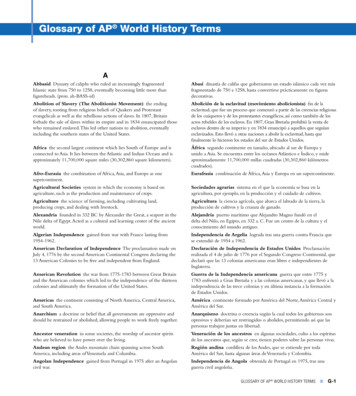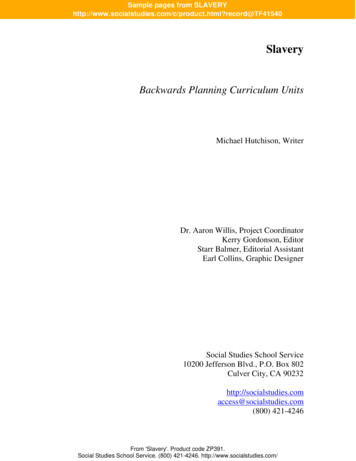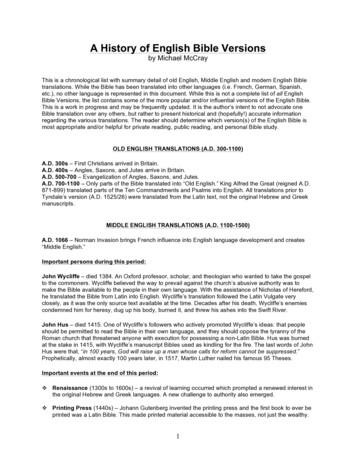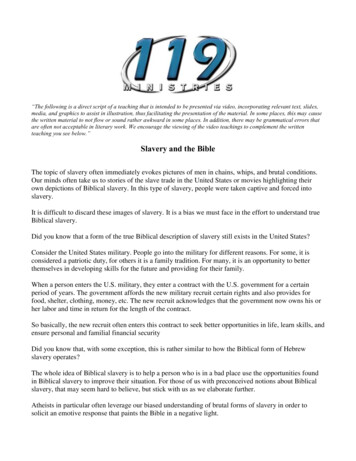
Transcription
“The following is a direct script of a teaching that is intended to be presented via video, incorporating relevant text, slides,media, and graphics to assist in illustration, thus facilitating the presentation of the material. In some places, this may causethe written material to not flow or sound rather awkward in some places. In addition, there may be grammatical errors thatare often not acceptable in literary work. We encourage the viewing of the video teachings to complement the writtenteaching you see below.”Slavery and the BibleThe topic of slavery often immediately evokes pictures of men in chains, whips, and brutal conditions.Our minds often take us to stories of the slave trade in the United States or movies highlighting theirown depictions of Biblical slavery. In this type of slavery, people were taken captive and forced intoslavery.It is difficult to discard these images of slavery. It is a bias we must face in the effort to understand trueBiblical slavery.Did you know that a form of the true Biblical description of slavery still exists in the United States?Consider the United States military. People go into the military for different reasons. For some, it isconsidered a patriotic duty, for others it is a family tradition. For many, it is an opportunity to betterthemselves in developing skills for the future and providing for their family.When a person enters the U.S. military, they enter a contract with the U.S. government for a certainperiod of years. The government affords the new military recruit certain rights and also provides forfood, shelter, clothing, money, etc. The new recruit acknowledges that the government now owns his orher labor and time in return for the length of the contract.So basically, the new recruit often enters this contract to seek better opportunities in life, learn skills, andensure personal and familial financial securityDid you know that, with some exception, this is rather similar to how the Biblical form of Hebrewslavery operates?The whole idea of Biblical slavery is to help a person who is in a bad place use the opportunities foundin Biblical slavery to improve their situation. For those of us with preconceived notions about Biblicalslavery, that may seem hard to believe, but stick with us as we elaborate further.Atheists in particular often leverage our biased understanding of brutal forms of slavery in order tosolicit an emotive response that paints the Bible in a negative light.
This is not necessarily done on purpose. Atheists have a different agenda. They seek to show that theBible is immoral and they will find ways to attempt to justify their position. They are not reallyinterested in what the Bible really teaches about Biblical slavery. But Biblical slavery certainly appearson the surface to support their atheist agenda. They are simply interested in justifying their hatred ofwhat they believe or want the Bible to teach, and they want others to reach the same conclusion,regardless of the lack of objective research they have entertained on the subject.A problem with atheism is that absolute morality simply does not exist. Morality is a prevailing orindividual opinion instead of universal and absolute. If we are simply an evolved bag of chemicals thatoccurred by chance, then morality is only an illusionary evolutionary byproduct.Christians often have a difficult time with the concept of Biblical slavery as well, and like the atheist,this is often due to a lack of research on the topic. However, quite often the Christian is open to honestlyresearching the topic and understanding the true Biblical perspective.That is what we hope to accomplish in this teaching. We are going to examine the two types of Biblicalslavery and all the commandments that govern them. We will expose the differences between Biblicalslavery and the type of slavery we often think of.The first misperception we need to address about Biblical slavery is the idea that the Bible teaches thatyou can force someone into slavery. This is simply not true.There exists a commandment that restricts taking a free man and entering him into slavery or the slavetrade. It not only restricts it, but to take a free person and enter them into the slave trade is punishable bydeath.Exodus 21:16Whoever steals a man and sells him, and anyone found in possession of him, shall be put todeath.This practice is reiterated in the New Testament in the negative as well:1 Timothy 1:10.the sexually immoral, men who practice homosexuality, enslavers, liars, perjurers, andwhatever else is contrary to sound doctrine,To take an unwilling person and force them to be a slave is subject to the most severe form ofpunishment that the Bible offers. It is no light matter. This commandment alone dispels the mostinaccurate depiction of Biblical slavery.The Hebrew word for slave is “ebed.” Slave is really too strong of a word. A slave has no rights. A slaveis considered property. In true slavery, you can do whatever you want to a slave without consequence.They are treated as less than human. The Hebrew word “ebed” is best understood as a contractualservant. An “ebed” has rights and benefits from the arrangement.It is a misconception is that Biblical slaves were chained, whipped, or constantly beaten. It is oftenbelieved that slaves were treated ruthlessly.However, that is not true.
An “ebed” is a contractual servant, not a less than human slave.Similar to live-in butlers or nannies, they had rights.not like the historical brutal conditions of forcedslavery found in other nations, or even like historical U.S. slavery.Everyone, including slaves, and even animals, had at least one full day off from work per week. (Exodus23:12). There were even other holidays that offered more rest days (Leviticus 23).Such servants are not to be treated ruthlessly, but treated with kindness.Leviticus 25:43You shall not rule over him ruthlessly but shall fear your God.The servants were to be treated with kindness. They were to be given adequate provision, such as food,shelter, and clothing. They were to be cared for and there was a responsibility for their safety and health,and there exists Biblical commandments to back this up and reinforce it.The extreme kindness to servants that is commanded in the Bible was often prefaced by a reminder thatthe Hebrews were also once actual slaves at the hands of the Egyptians. In other words, they were totreat servants in a way that they wanted to be treated.not as the Egyptians treated the Hebrews as slaveswith no rights, but as contractual servants with rights affording safety, clothing, food, shelter and evengenerous provisions at the close of the contract.If a servant decides to leave at the close of the service contract, the contractual servant is blessedsubstantially.Deuteronomy 15:12-15“If your brother, a Hebrew man or a Hebrew woman, is sold to you, he shall serve you six years,and in the seventh year you shall let him go free from you. And when you let him go free fromyou, you shall not let him go empty-handed. You shall furnish him liberally out of your flock,out of your threshing floor, and out of your winepress. As the Lord (YHWH) your God hasblessed you, you shall give to him. You shall remember that you were a slave in the land ofEgypt, and the Lord (YHWH) your God redeemed you; therefore I command you this today.This practice highlights the gratitude that is to be afforded to the contractual servants.Hebrew servants were contractually committed to being a servant for six years. In the seventh year thecontract was considered fulfilled. However, servants were treated so well that there was even a protocolestablished for servants who loved their master, and could extend the contract to be perpetually ongoing.Exodus 21:5-6But if the slave plainly says, ‘I love my master, my wife, and my children; I will not go outfree,’ then his master shall bring him to God, and he shall bring him to the door or the doorpost.And his master shall bore his ear through with an awl, and he shall be his slave forever.This is referring to a servant who accepted a wife provided by the employer. The wife and children arenot permitted to leave at the same time as the husband. If a servant wishes to avoid this scenarioaltogether, the servant could always not accept a wife from the employer during the length of the
contract. The servant is welcome to marry a wife not from the employer, or not get married at all.Simply put, the servant has a choice and knows the conditions of any decision he makes on this matter.Just because the male servant marries the employers female servant does not give the male servant theright to break the contract that the female servant has with the employer. As we will see later, if hewanted to, he could also redeem her or wait till her contract expires with the employer should he notwant to commit forever to that employer.The critical point is this, in this case, the servant knows all of this beforehand, and can make the rightchoice for himself.Moving on.Servants injured by the employer were to be released from the contract.such behavior by employerswas not tolerated.Exodus 21:23-27But if there is harm, then you shall pay life for life, eye for eye, tooth for tooth, hand for hand,foot for foot, burn for burn, wound for wound, stripe for stripe.When a man strikes the eye of his slave, male or female, and destroys it, he shall let the slave gofree because of his eye. If he knocks out the tooth of his slave, male or female, he shall let theslave go free because of his tooth.Slaves of other nations do not have such rights, but a Biblical “ebed” has such rights. This highlights thefact that if there is any evidence that an “ebed” is being mistreated that they have the right to terminatetheir service to their employer. The employer could also face consequences as well. As alreadymentioned, an employer is commanded to not treat an “ebed” ruthlessly. An “ebed” accusing anemployer of practicing mistreatment would be heard by the elders at the gates for judgment.Hebrew servants could not be sold by their employers. A slave of other nations did not have such rights,but an “ebed” does.Leviticus 25:42For they are my servants, whom I brought out of the land of Egypt; they shall not be sold asslaves.We are to love the stranger, because we were once slaves.Leviticus 19:34You shall treat the stranger who sojourns with you as the native among you, and you shall lovehim as yourself, for you were strangers in the land of Egypt: I am the Lord (YHWH) your God.So, how does one become a slave?If no one can force you as a free person to become a slave, it must mean that you become a slavebecause you chose to become a slave, or you were already a slave.If you are a Hebrew, meaning a person of Biblical faith, you have the opportunity to sell your labor andbecome a servant. You might do this because you have become poor and all you have left as an asset is
your labor itself. In this case you may chose to support your family by coming under another family toexchange your labor for food, shelter, clothing, etc. for a contractual period of time. Perhaps you evenwant to learn a new trade, such as being a blacksmith. Today, we would call that being an apprentice oran internship. At the end of the contract as a Hebrew servant you can choose to leave being generouslyfurnished with livestock and other assets, or you can commit to life as a servant with that family.Another way to become a slave is if you are a thief. If a thief steals something from someone, they are torepay it back and then some. If they cannot afford it, then they have to work off their debt.Exodus 22:1-3If a man steals an ox or a sheep, and kills it or sells it, he shall repay five oxen for an ox, and foursheep for a sheep. If a thief is found breaking in and is struck so that he dies, there shall be nobloodguilt for him, but if the sun has risen on him, there shall be bloodguilt for him. He shallsurely pay. If he has nothing, then he shall be sold for his theft.Instead of simply sending someone to “jail” where society is further burdened from the costs, the thiefhas to repay society back, and then some. This is a fair and beneficial commandment for all of society.If you are already slave in a foreign land, a Hebrew can rescue you from the harsh forms of oppressiveslavery found in foreign lands and bring you into the Biblically mandated form of respectable servanthood.Leviticus 25:39-46If your brother becomes poor beside you and sells himself to you, you shall not make him serveas a slave: he shall be with you as a hired worker and as a sojourner. He shall serve with youuntil the year of the jubilee. Then he shall go out from you, he and his children with him, and goback to his own clan and return to the possession of his fathers. For they are my servants, whomI brought out of the land of Egypt; they shall not be sold as slaves. You shall not rule over himruthlessly but shall fear your God. As for your male and female slaves whom you may have: youmay buy male and female slaves from among the nations that are around you. You may also buyfrom among the strangers who sojourn with you and their clans that are with you, who have beenborn in your land, and they may be your property. You may bequeath them to your sons after youto inherit as a possession forever. You may make slaves of them, but over your brothers thepeople of Israel you shall not rule, one over another ruthlessly.God prefaces this passage specifically with a reminder that YHWH saved them from their bondage ofslavery in Egypt. Again, if one becomes poor, he can sell himself into servitude and be released as wasalready discussed.Verse 44 discusses slaves that they may already have from nations around them. They can be bought andsold. It doesn’t say to seek them out or have forced slavery. Hence, it is not giving an endorsement ofseeking new slaves or encouraging the slave trade. This also does not restrict other people in culturesaround them from selling themselves as bondservants. But as discussed already, there are passages forthe proper and godly treatment of servants.We should treat them as we would want to be treated.Leviticus 19:34You shall treat the stranger who sojourns with you as the native among you, and you shall love
him as yourself, for you were strangers in the land of Egypt: I am the LORD (YHWH) your God.Colossians 4:1Masters, give your bondservants what is just and fair, knowing that you also have a Master inheaven.Sadly, some Israelite kings later tried to institute forced slavery, for example Solomon (1 Kings 9:15)and Rehoboam with Adoniram (1 Kings 12:18). Both fell from favor in God’s sight and were found tofollow after evil (1 Kings 11:6; 2 Chronicles 12:14).As a further protection from poor employers, an “ebed” was ALWAYS free to simply run away if theworking conditions were not considered fair or safe. This ensures that the “ebed” was always therebased on free will and not as a forced or oppressive form of slavery.Deuteronomy 23:15You shall not give up to his master a slave who has escaped from his master to you. Heshall dwell with you, in your midst, in the place that he shall choose within one of your towns,wherever it suits him. You shall not wrong him.If an “ebed” runs away from a corrupt employer, he is free, and permitted to live as any free person inthe town he chooses. In other words, the employer has to be so fair, so kind, and so giving, that the“ebed” will want to stay and not run away.Slaves were rescued out of the slave trade of other nations, conditions that were likely brutal and morelike slavery that we have already conjured up in our mind.bringing them to conditions that were notonly more humane, but actually more preferable than running away and trying to make it on your own.Slaves could also be redeemed by others, or a slave could even redeem himself by buying his way out ofthe contract.Leviticus 25:47-55“If a stranger or sojourner with you becomes rich, and your brother beside him becomes poorand sells himself to the stranger or sojourner with you or to a member of the stranger's clan, thenafter he is sold he may be redeemed. One of his brothers may redeem him, or his uncle or hiscousin may redeem him, or a close relative from his clan may redeem him. Or if he grows rich hemay redeem himself. He shall calculate with his buyer from the year when he sold himself tohim until the year of jubilee, and the price of his sale shall vary with the number of years. Thetime he was with his owner shall be rated as the time of a hired worker. If there are still manyyears left, he shall pay proportionately for his redemption some of his sale price. If there remainbut a few years until the year of jubilee, he shall calculate and pay for his redemption inproportion to his years of service. He shall treat him as a worker hired year by year. He shall notrule ruthlessly over him in your sight. And if he is not redeemed by these means, then he and hischildren with him shall be released in the year of jubilee. For it is to me that the people of Israelare servants. They are my servants whom I brought out of the land of Egypt: I am the Lord(YHWH) your God.”There is also clear delineation between male servants and the female servants in Exodus 21:7.Exodus 21:7
“When a man sells his daughter as a slave, she shall not go out as the male slaves do. If she doesnot please her master, who has designated her for himself, then he shall let her be redeemed. Heshall have no right to sell her to a foreign people, since he has broken faith with her.”A Hebrew male could sell himself into servitude for his labor (to cover his debts, and so on) and bereleased after six years. A Hebrew female could be sold into servitude, with permission of her father, notfor labor purposes but for marriage. Verse 8 discusses breaking faith with her, which means that theyhave entered into a marriage covenant (see Malachi 2:14).Exodus 21:8If she does not please her master, who has designated her for himself, then he shall let her beredeemed. He shall have no right to sell her to a foreign people, since he has broken faith withher.If YHWH approved of the female leaving in six years, then marriage is no longer a life-long covenant.So God is honoring the sanctity of marriage here.Imagine what would happen if this rule was not in place. It would mean that men would have the freereign to marry a woman for six years and then “trade” her in for another woman. This is not approved ofin the Bible. Of course, when a man buys a male servant, they are not married, and so the male servantswere to be set free.There is more to Exodus 21:7 to consider. The daughter is being sold as “amah” (female bondservant)Based on contextual consideration, the daughter is sold by father for marriage, for seven years.so,should the terms of marriage not be fulfilled, it is to be considered a breach of contract, and thepurchaser must allow the girl to be redeemed. She must not be sold outside that family. She must betreated as a daughter or a free-born woman. Or forfeiture cause will be evoked. Atheists often read intotext with their own biased understanding of Hebrew servants, with no knowledge of Hebrew or culturalbackground.Let’s move on to some related passages in Brit Hadasha, or the New Testament.Luke 12:43–48Blessed is that servant whom his master will find so doing when he comes. Truly, I say to you,he will set him over all his possessions. But if that servant says to himself, ‘My master is delayedin coming,’ and begins to beat the male and female servants, and to eat and drink and get drunk,the master of that servant will come on a day when he does not expect him and at an hour hedoes not know, and will cut him in pieces and put him with the unfaithful. And that servant whoknew his master's will but did not get ready or act according to his will, will receive a severebeating. But the one who did not know, and did what deserved a beating, will receive a lightbeating. Everyone to whom much was given, of him much will be required, and from him towhom they entrusted much, they will demand the more.As for Yeshua’s supposed support for ruthlessly beating slaves, this is in the context of a parable.Parables are stories Yeshua told to help us understand spiritual truths.For example, in one parable Yeshua likens God to a judge (Luke 18:1–5). The judge is unjust, buteventually gives justice to the widow when she persists. The point of that story was not to tell us thatGod is like an unjust judge—on the contrary, He is completely just. The point of the parable is to tell us
to be persistent in prayer.Similarly, Luke 12:47–48 does not encourage beating slaves. It is not a parable telling us how mastersare to behave. It is a parable telling us that we must be ready for when Yeshua Himself returns. One willbe rewarded by believing and following the teachings of our Messiah, the Torah. For those thatdiscarded the Word of God, which is the will of God, punishment follows.Ephesians 6:5–9Bondservants, obey your earthly masters with fear and trembling, with a sincere heart, as youwould Christ, not by the way of eye-service, as people-pleasers, but as bondservants of Christ,doing the will of God from the heart, rendering service with a good will as to the Lord and not toman, knowing that whatever good anyone does, this he will receive back from the Lord, whetherhe is a bondservant or is free. Masters, do the same to them, and stop your threatening, knowingthat he who is both their Master and yours is in heaven, and that there is no partiality with him.The Bible teaches that we are to be just and fair to servants.Colossians 4:1Masters, give your bondservants what is just and fair, knowing that you also have a Master inheaven.DIFFICULT VERSESExodus 21:20-21“When a man strikes his slave, male or female, with a rod and the slave dies under his hand, heshall be avenged. But if the slave survives a day or two, he is not to be avenged, for the slave ishis money.”Murder of servants is strongly prohibited and was punishable by death. This is often ignored byunbelievers.but this is a very merciful truth that needs to be highlighted.Verse 21 though is often misunderstood.Exodus 21:21But if the slave survives a day or two, he is not to be avenged, for the slave is his money.The employer is given benefit of the doubt that he was not intending to murder the servant, but wassimply disciplining the servant for doing something that they were not supposed to do. This does notmean that it was considered moral or ok that they die after a few days. Life for a life only applied whenthere was conscious intent to murder.But what about phrase “the slave is his money” .that seems to suggest that the slave is his property.Though in the English it says “the slave is his money” .in the Hebrew it is really saying that the “fee” ishis money.The employer would suffer financial loss because of the accidental fatality. The death was accidental,and the boss paid for medical treatment as the context shows.thus the punishment already given to the
boss is the money he paid trying to save the servant.There is no such thing as Biblical prisons. Everyone is to understand the Biblical commandments and beaccountable to them. If one of your employees acts out and breaks the law and trespasses against you,you can discipline them but its clear that you can't kill them unless the trespass requires it.But even then, the employer can be called before the judges at the city gates. There are checks andbalances. But today we have prisons that are overcrowded when they shouldn't be. That was not part ofGod's plan.That text does not condone the beating of slaves. It specifies the punishment appropriate for beating aslave severely. There are two scenarios given: In the first scenario, the slave owner intentionally beat theperson to death, which was murder, and punishable by death; In the second scenario, the owner isoverzealous and unintentionally causes the slave's death, and the punishment for that is financial loss,"for the fee is his money."The employer is to always treat his servants fairly:Colossians 4:1Masters, treat your bondservants justly and fairly, knowing that you also have a Master inheaven.While disciplining servants is something that might seem unfair to us today, it must be remembered thatboth the employer and the servant are subject to Biblical rules, and both the employer and the servantare both subject to punishment should those rules be violated.The system is designed for both the employer and the servants to be treated fairly, and should theservant ever feel that it is not fair, they always have the option to leave.The fact that most servants did not leave their employer, and even in some cases decided to stay with theemployer for life even after the contract concluded, highlights the fact that benefits existed for both theemployer and the servant.The atheist would have us believe that: The servant was involuntarily entered into slavery. We have proven that is not the case.The servant was treated unfairly or ruthlessly. We have proven that is not the case.The servant had no choice in exiting the contract in an unfair environment. We have proven thatis not the case.The servant did not benefit from the arrangement. We have proven that is not the case.The employer could do whatever he wanted to the servant. We have proven that is not the case.The servant was not afforded protection, provisions, or rights. And we have proven that is not thecase.Nearly everything that is commonly taught from the atheist perspective about Biblical slavery is outrightincorrect and merely the result of lazy or agenda-fueled research.Slaves under God’s law, the Torah, were different from the harshly treated slaves of other societies; theywere more like servants or bondservants. Slaves from other foreign societies could be rescued and
entered into the just and favorable Hebrew system.The Bible doesn’t give an endorsement of slave traders but just the opposite (Exodus 21:16; 1 Timothy1:10). A Hebrew slave/bondservant was acquired when a person voluntarily entered into it when heneeded to pay off his debts.Israelites could sell themselves as slaves/bondservants to have their debts covered, make a wage, havehousing, and be set free after six years and be given ample provisions at the close of the contract.Foreigners could sell themselves as slaves/bondservants as well.The Messianic ConnectionThe Biblical model of bond-servants is also a picture of our relationship with our messiah Yeshua. Wewere slaves to sin, and he paid the price and redeemed us. We then become bondservants of MessiahYeshua.1 Corinthians 7:21-31Were you a bondservant when called? Do not be concerned about it. (But if you can gain yourfreedom, avail yourself of the opportunity.) For he who was called in the Lord as a bondservantis a freedman of the Lord. Likewise he who was free when called is a bondservant of Christ.You were bought with a price; do not become bondservants of men.Romans 6:16-23Do you not know that if you present yourselves to anyone as obedient slaves, you are slaves ofthe one whom you obey, either of sin, which leads to death, or of obedience, which leads torighteousness? But thanks be to God, that you who were once slaves of sin have becomeobedient from the heart to the standard of teaching to which you were committed, and, havingbeen set free from sin, have become slaves of righteousness. I am speaking in human terms,because of your natural limitations. For just as you once presented your members as slaves toimpurity and to lawlessness leading to more lawlessness, so now present your members as slavesto righteousness leading to sanctification.For when you were slaves of sin, you were free in regard to righteousness. But what fruit wereyou getting at that time from the things of which you are now ashamed? For the end of thosethings is death. But now that you have been set free from sin and have become slaves of God, thefruit you get leads to sanctification and its end, eternal life. For the wages of sin is death, but thefree gift of God is eternal life in Christ Jesus our Lord.Just as the Hebrew bondservant had a choice at the end of six years to commit forever as a servant,likewise so do we. At the end of 6,000 years, we are resurrected, committed to service to YHWH’s gloryfor all of eternity.For more on the concept of the 6,000 year prophecies, we would recommend the following teachings: The 4th and 7th Day (Two Parts)Hebrews 4: In His Rest Now or Later?The Creation Prophecy
There is one more Biblical way that a foreigner can become a slave. Israel had many enemies. If anenemy resided outside of Israel, and was enough of a threat to merit war, Israel was commanded to offera peace treaty first. Israel could not simply go and attack a nation without offering peace.Should the nation accept the peace treaty, as proof and condition of peace, the enemy was to surrenderand work for the Hebrews.Deuteronomy 20:10-11When you draw near to a city to fight against it, offer terms of peace to it. And if it responds toyou peaceably and it opens to you, then all the people who are found in it shall do forced laborfor you and shall serve you.While that may seem unfair, it is a peaceful resolution. As we have already shown, being a servant in aHebrew community is not a harsh or ruthless environment. Servants were still to be treated with respectand be given food, shelter, clothing and more and should be considered a favorable alternative to war.Such a condition is the only way to know for sure that the declaration of peace is certain and notdeceptive. If a nation is interested in avoiding this situation, it is best to not be an enemy of Israel.While some may cry fowl at this protocol, quite frankly, it is war between enemies. War betweenenemies does not require fairness. It often doesn’t. Israel off
Slavery and the Bible The topic of slavery often immediately evokes pictures of men in chains, whips, and brutal conditions. Our minds often take us to stories of the slave trade in the United States or movies highlighting their own depictions of Biblical slavery. In this type of sl


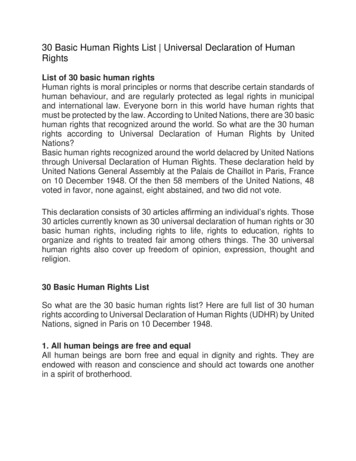


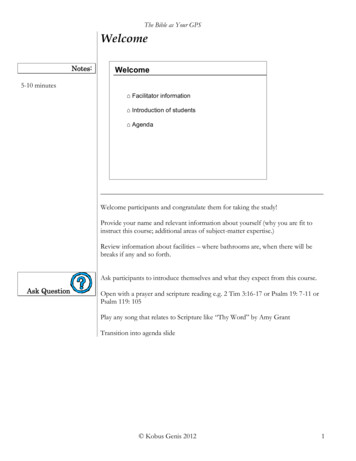
![[Final] Documenting the University of Pennsylvania’s .](/img/9/csgraubard-documenting-the-university-of-pennsylvanias-connection-to-slavery.jpg)
